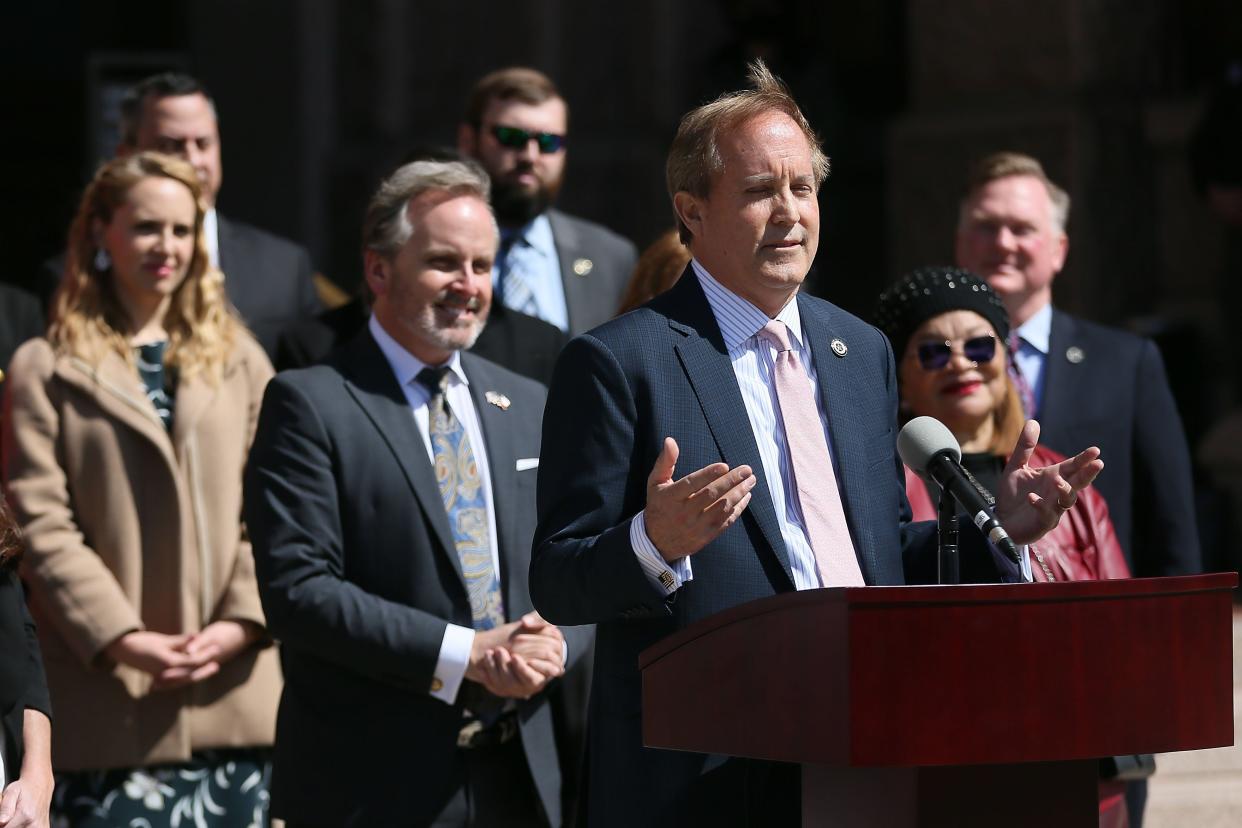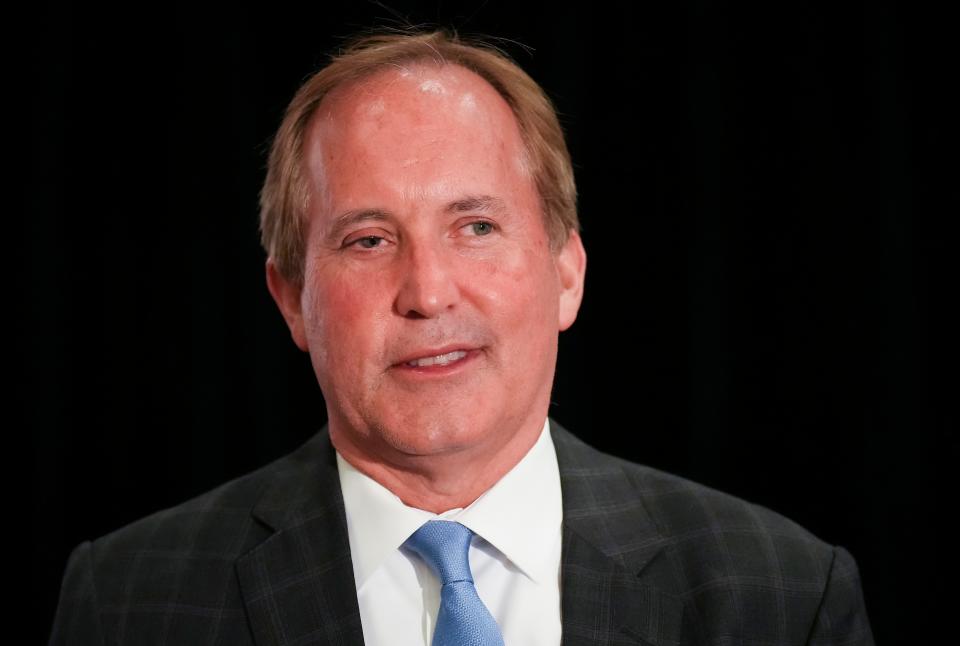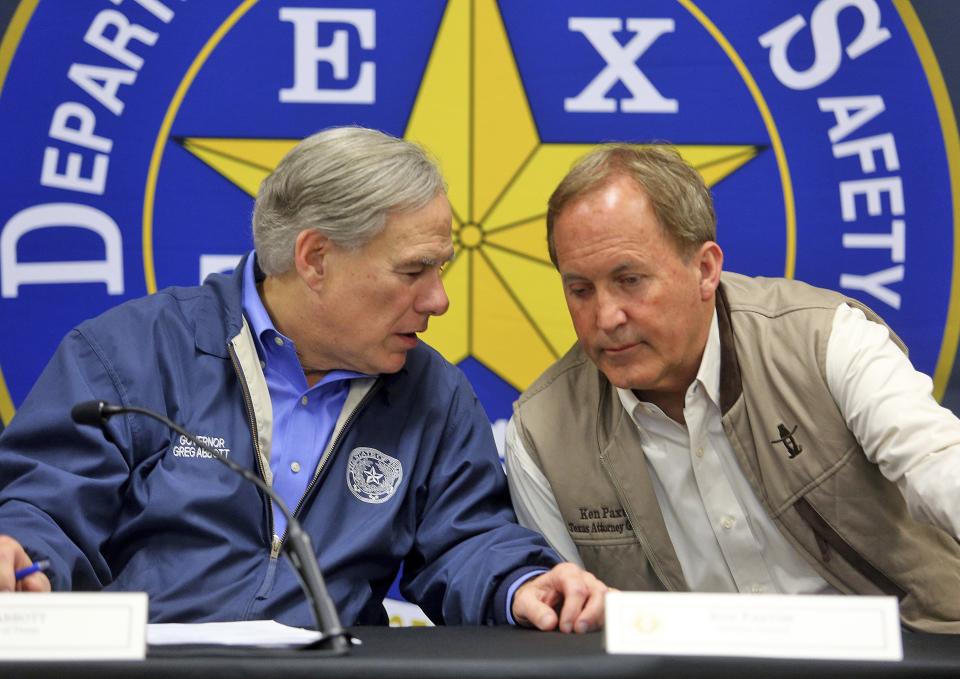Where does Ken Paxton stand in effort to toss lawsuit accusing him of misconduct?
- Oops!Something went wrong.Please try again later.

The appeals process has grown a bit longer in state Attorney General Ken Paxton's effort to dismiss a whistleblower lawsuit by four top agency officials who claim they were improperly fired in 2020 after accusing him of accepting bribes and other misconduct.
Paxton turned to the Texas Supreme Court 7½ months ago after two lower courts rejected his bids to toss out the lawsuit.
Last month, the Supreme Court told Paxton and the whistleblowers to provide justices with a deeper dive into the legal issues involved, kicking off a second round of legal briefing that was recently extended when the court granted Paxton's request for an extra month to file his expanded brief.
More: New court filing expands bribery allegations against Texas Attorney General Ken Paxton

Paxton's brief is now due July 27, and although the court told Paxton that additional extensions aren't likely to be granted, the move means the final brief isn't due until Aug. 31 at the earliest.
That moves the case into election season as Paxton seeks a third four-year term against a Democrat, Rochelle Garza, who has made questioning Paxton's ethics a campaign centerpiece. Three opponents tried the same tactic against Paxton in this year's GOP primaries without success.
Previously: Paxton asks Supreme Court to dismiss whistleblower lawsuit against him
The timing also puts the case close to the two-year anniversary of when eight top officials of the attorney general's office met with FBI agents and other investigators to relate their suspicions that Paxton had misused the powers of his office to help a friend and political donor, Austin real estate investor Nate Paul.
Three of those officials resigned. Five were fired, and four responded by filing suit, arguing that Paxton and the attorney general's office violated the Texas Whistleblower Act, which protects government workers from retaliation for reporting illegal conduct to law enforcement.
That lawsuit was still in its earliest stages when Paxton moved for dismissal, so none of its claims have been heard in court.
Instead, the fight thus far has focused on Paxton's claim that the former agency officials have no legal right to sue him.

'Prompted by illicit motives'
The lawsuit, filed in 2020 and expanded last year, said whistleblowers approached the FBI after concluding that Paxton had been misusing the power of his office to help Paul in exchange for favors that included a home remodel and a job for Paxton’s mistress.
"Some of Paxton’s actions," the lawsuit argued, "were so egregious and so contrary to appropriate use of his office that they could only have been prompted by illicit motives such as a desire to repay debts, pay hush money, or reciprocate favors extended by Paul."
The lawsuit also said Paxton engaged in a series of "bizarre" or unprecedented actions to help Paul, such as intervening in an open records decision to help Paul gain documents about a search of the businessman's home and businesses by federal investigators in 2019.
The whistleblowers also accused Paxton of improperly intervening in a lawsuit between Paul and a local charity, ordering his agency to issue a rushed legal opinion that helped Paul with a pending foreclosure sale, and violating agency rules to hire a lawyer with little experience to investigate Paul's allegation that the 2019 search warrants were illegal.
The whistleblowers are four top officials who were hired or promoted by Paxton before losing their jobs in October and November 2020:
• David Maxwell, former director of the agency's Law Enforcement Division.
• Ryan Vassar, former deputy attorney general for legal counsel.
• Blake Brickman, former deputy attorney general for policy and strategy initiatives.
• Mark Penley, former deputy attorney general for criminal justice.
Ken Paxton: 'I make no apologies'
Paxton has proclaimed his innocence, blaming the allegations on "rogue" employees who worked to thwart his efforts to fully investigate serious accusations that Paul had raised about potentially illegal searches of his home and businesses by federal agents.
"I make no apologies for being a fierce investigator and defender of individual rights in the face of potentially unreasonable and authoritarian actions," Paxton said in November 2020. "Doing so is not favoritism. It is doing what the people of Texas expect from every law enforcement agency, their attorney general, and the staff of this office."
Through a spokesman, Paxton has also said the accusations are "completely false, and they will be proven false in court."
Even so, Paxton moved to avoid that step by seeking to have the whistleblower lawsuit dismissed before a trial could take place.
State District Judge Amy Clark Meachum rejected Paxton's bid in March 2021, and the Austin-based 3rd Court of Appeals came to the same conclusion seven months later.
Both of those rulings were made by Democratic judges. By asking the state Supreme Court to intervene, Paxton is now before a court where all nine members are Republicans.
Can Ken Paxton be sued? He says no
In his first round of legal briefs, Paxton told the Supreme Court that his agency enjoys the right to fire its employees at will — "especially employees whose political appointments require they act on behalf of the duly elected Attorney General."
Paxton also argued that he can't be sued because the Texas Whistleblower Act was written to protect government employees from on-the-job retaliation by another public employee.
"The Attorney General is not a 'public employee,'" the brief said. "Like the Governor, the Lieutenant Governor, and members of this Court, he is an elected officer, chosen by the people of Texas to exercise sovereign authority on their behalf."
Instead, Paxton argued, the law applies to "an employee or appointed officer" of a government body, not an elected officer.
Separately, Paxton argued that the whistleblowers should not be allowed to "transform policy disagreements" into accusations of wrongdoing based on "vague, conclusory, and speculative allegations that the Attorney General acted with improper intent."
Paxton asked the court to consider the bribery allegation.
"At a minimum, bribery requires that a defendant 'offer' or 'solicit' a benefit as consideration for an official act," and generally requires a bilateral agreement between the side paying the bribe and the side receiving it, Paxton argued.
"But plaintiffs cannot identify an offer or solicitation of a bribe by either Paxton or Nate Paul, let alone an agreement between the two," the brief said. "They have to articulate the elements of an alleged bribe. They do not."
Whistleblowers fire back at Ken Paxton
In a reply brief, the whistleblowers took exception to Paxton portraying their allegations as "policy disagreements," calling it an "alternate fact" that ignores reality.
The whistleblowers "are politically aligned with Paxton and were all handpicked to lead his office. But they did not owe such a duty of personal loyalty to him that they were required to look the other way when they observed illegal conduct," their brief said.
Paxton's accusers added that, with a combined decades of experience as lawyers and law enforcement professionals, they were qualified to examine Paxton's actions and deduce "multiple instances of Paxton’s misconduct."
Likewise, the whistleblowers challenged Paxton's characterization of their bribery allegations, saying they included plenty of details on "bilateral agreements" based in part on alleged benefits provided to Paxton, coupled with the attorney general's highly unusual interventions and "repeated interference" on Paul's behalf.
The whistleblowers also encouraged the Supreme Court to reject arguments that Paxton, as an elected official, is untouchable under the whistleblower act.
Agreeing with Paxton would eliminate legal protection for employees who report misconduct by thousands of elected officials across the state, they said.
This article originally appeared on Austin American-Statesman: Another delay in Ken Paxton bid to dismiss lawsuit alleging misconduct

